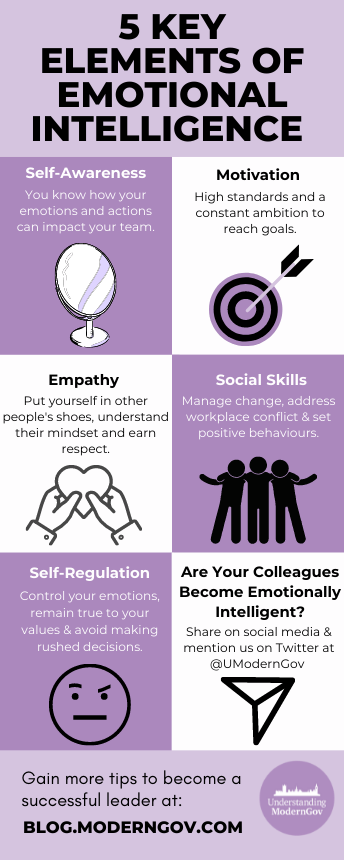5 Ways Emotional Intelligence Can Help You Become A More Successful Leader
 Chloe Martin
·
2 minute read
Chloe Martin
·
2 minute read
If you want to strengthen your team, prevent employee turnover and become a better leader, emotional intelligence is the way forward.
What is Emotional Intelligence?
“Emotional Intelligence (or EI) is a way of recognising, understanding, and choosing how we think, feel and act. It shapes our interactions with others and our understanding of ourselves. It defines how and what we learn; it allows us to set priorities; it determines the majority of our daily actions.” Joshua Freedman; in “Handle With Care: Emotional Intelligence Activity Book”
Why is Emotional Intelligence important in leadership?
“Success at work is 80% dependent on Emotional Intelligence and only 20% on IQ” HR Magazine 1997 (Based on work by Daniel Goleman)
To be an effective leader, it is important to be able to understand and manage both your and your team members' emotions. By being able to read the emotions of others, you can better engage and motivate them.
As a leader, emotional intelligence can have a huge influence on your relationships, with your team, and with how you interact with individuals in the workplace.
According to Daniel Goleman a leading American psychologist, there are 5 key elements to emotional Intelligence. Utilised as leadership skills, these elements can help you become an even greater leader.
Discover which benefits employees prefer more than a raise.
The 5 Key Elements of Emotional Intelligence
1) Self-Awareness
Being self-aware is like having your own emotional sense check. You know how your emotions and actions can affect your team. As a self-aware leader, you will have a clear picture of your strengths and weaknesses, allowing you to remain grounded and act with humility.
2) Self-Regulation
Good leaders who can regulate themselves effectively tend to avoid emotional outbursts and making rushed decisions. By controlling your emotions you can better engender trust amongst your colleagues and remain true to your values.
3) Motivation
Self-motivated leaders have a constant ambition to achieve and exceed their goals. They have exceptionally high standards and are seen as role models by their team and colleagues.
4) Empathy
Having empathy allows you to put yourself in other people’s shoes, which can help you better understand your team’s mindset. Leaders with empathy and the ability to understand others are able to better develop their staff, earn their respect and lead them to greater success.
5) Social Skills
Effective leaders with strong social skills tend to be excellent communicators and have the ability to engage and motivate their teams to go the extra mile. They are also able to address workplace conflict, manage change and set positive examples through their behaviour.
Learn more about what skills you need to be an effective leader in the public sector.
How Can This Help You?
Leaders who can demonstrate high levels of emotional intelligence can drive their organisation forward and create safer, more productive working environments compared to those that lack emotional intelligence.
By applying emotional intelligence techniques, as a management tool, you can support your team members to adapt and thrive.
Share the graphic below with your social networks or colleagues - don't forget to mention us on Twitter at @UModernGov.
Develop your Leadership Skills with our Training Courses
These are just a few ways you can use Emotional Intelligence to enhance your leadership skills, if you want to find out more, why not take a look at our range of leadership courses or contact us at enquiries@moderngov.com.
2+ years in SEO and content marketing. Striving to help public sector professionals develop their skills and learn something new through high-quality content.







